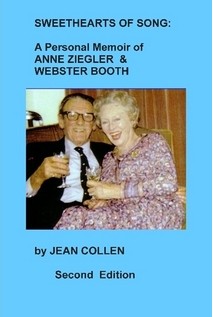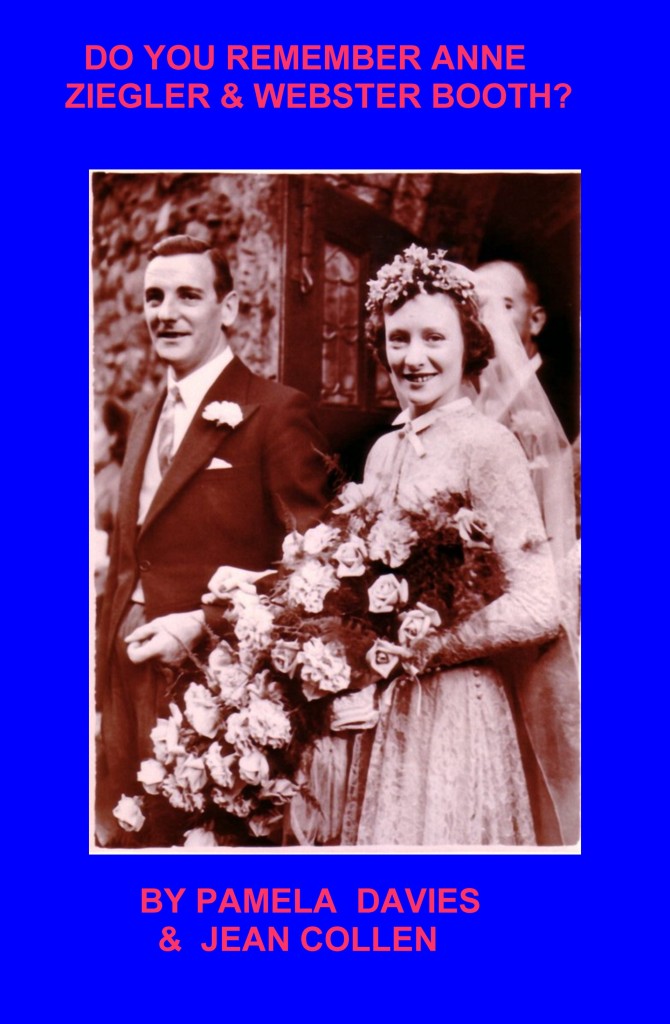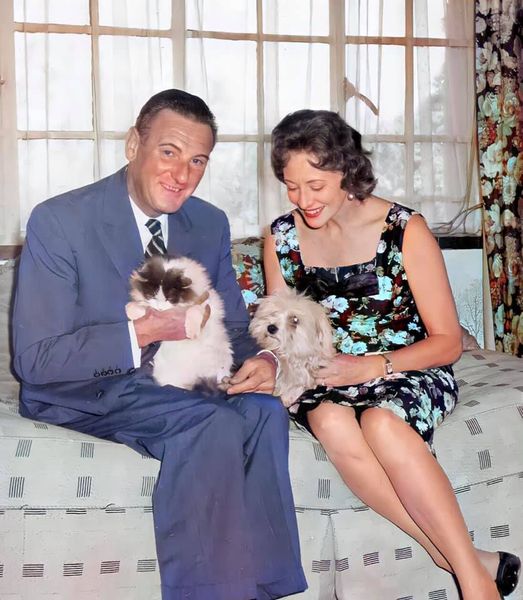

I had prepared this for the 20th anniversary of the death of Anne Ziegler but I was taken ill in September of 2023 and spent nearly three weeks in hospital. Dudley Holmes was kind enough to remember the day in the Webster Booth-Anne Ziegler Appreciation Group on Facebook for me. I am a little better now and can post this tribute to Anne now.
It is hard to believe that it is twenty years since Anne Ziegler died on 13 October 2003. I have included an extract from my book here to commemorate the day. It may be found at: https://www.lulu.com/spotlight/duettists

In 2002 Anne was saddened at the death of the Queen Mother and went into mourning for her with the rest of the nation. The photograph of the Queen Mother, which she had presented to Anne on their visit to the Royal Lodge, had a prominent place in her sitting room. Anne said that she would always remember the Queen Mother’s kindness to them on that visit. She wrote to me, “She was one of our genuine fans”. I recalled that the Queen Mother had told me this much herself when I was presented to her at Wheathampstead Secondary School in 1968.

Anne was finding it increasingly difficult to take Toby, her little Yorky, for his daily walk, although the doctor assured her that the exercise was good for her. Her feet were water-logged and walking was increasingly painful. When things became too much for her she reluctantly gave him up to a new owner with a big garden. He was taken for two long walks on the beach each day. Although she missed him terribly she could not bring herself to phone the new owner to inquire about him, as she could not have borne it if anything had happened to him.

After another bad fall Anne spent a month in hospital and convalescent home. In September she was back in hospital with further heart problems. She needed help with her shopping. She told me that it was all very well to look back on her singing career, but these memories did not help her with the struggle of day-to-day living. She added, “What can you expect at ninety-two?”
She was not alone at Christmas the following year, but spent the day with the late Sally Rayner, a reflexologist, who. although a fairly recent acquaintance, had taken over Jean Buckley’s role as executrix of her will. Anne looked forward to seeing Gwen, her home help, once a week and sometimes went shopping with her. She wore a panic button around her neck in case she had a bad turn and could not reach the telephone, and she arranged to have meals from Meals on Wheels delivered to her. She told me that after the age of ninety the body packs up even though the mind might remain alert.
Dudley Holmes was planning to go over to the UK in September 2003 to visit Anne with his friend, Reverend Owen Franklin, who was a priest at a parish in Newcastle-under-Lyme.

I received my last letter from Anne, dated 15 June 2003. She did not feel well, but was grateful that her carer came in each day for an hour and that Sally was kind enough to do her shopping for her. She still had her car, but was sad that there was nobody who had time to go out for coffee or shop with her.
She added:

Since my trip to visit her in the UK we had spoken on the phone at regular intervals. For the last few years Anne had not written as frequently as before, although I had continued to write to her, whether she wrote or not. Not all her other friends did the same.
She said:
“I seem to have stopped hearing from my other SA friends – I am wondering if they have ‘“popped off”’ – or it’s too much trouble to write!!”
I phoned Anne on 3 August 2003. By this time her carer was coming in three times a day. Anne could still joke, “Once in the morning to see I am still alive, next at lunch time, and then at 6pm to see I’m having supper and set for the night.”
We spoke of the days in Johannesburg when I was young – and she much younger – when everything had been happy and carefree. She could not believe that I was nearly sixty as she always thought of me as a young woman. It was forty years since I had first started playing for Webster when she went away on the trip with Leslie Green.
She had not seen her old friend Babs Wilson-Hill (who had bought the bungalow for them) for over a year and did not know if she was alive or dead. We decided that it was a pity that things had worked out so badly with Babs, as it could have been a very happy arrangement.
Five days after that phone call Anne had another dreadful fall. She was taken to the Llewellyn Ward at Llandudno Hospital, where Dudley and Owen found her in September. She was pleased to see Dudley, but he was deeply shocked at the change in her physical appearance. Dudley spoke to Sally, who told him that Anne could never return to the bungalow and that they were looking round to find a suitable frail care home for her. Although she would probably never be able to write to us again, we vowed that we would write to her regularly as long as she lived.
On 27 September I wrote a letter to Anne and enclosed a cutting about Kathleen Ferrier on the fiftieth anniversary of her death, and sent it care of Sally Rayner. On the morning of the 13 October there was a message from Sally to tell me that Anne was unlikely to last for more than a day or two.
I phoned Sally immediately and she told me that she was going in to sit with her that morning. Later that day Sally phoned again to let me know that Anne had died peacefully. She had sat with her, and later in the morning had been joined by Anne’s great-nephew, Michael, Jinnie’s son, from Liverpool. They remained with her, holding her hand until she passed away peacefully at 1.30 pm.
Sally had taken my letter in that morning to read out bits of interest to her – about Kathleen Ferrier, the records my actor friend, the late Bill Curry, had given me, and Love’s Philosophy, the song she had sung at her Wigmore Hall recital all those years ago. Sally said that some parts of the letter made her smile, although she had not opened her eyes for a long time.
Anne’s funeral took place on 21 October at 2.00 pm. The organist played We’ll Gather Lilacs at the beginning and their recording of Now is the Hour was played at the end of the service as the coffin disappeared behind the curtain. One of Sally’s friends, Stanley, a member of the Rhos on Sea Savoyards, sang their signature tune, Only a Rose, during the service.

About forty people, including Webster’s grandson, Nicholas Leslie Booth, and the Meals on Wheels ladies, attended the service on a rainy afternoon. Most of the people present had some firm connection with Anne, although there were a few curious “hangers-on” there too. Forty people did not seem a large number considering who she was and how many friends she had made over the years.
A week or so later I was surprised to hear from Anne’s solicitors in Rhos on Sea that she had left me a legacy in her Will.

There were obituaries for Anne in papers all over the world, but I was saddened that little notice was paid to her death in South Africa, where she and Webster had lived and worked for twenty-two years. My husband, Errol, sent an e-mail to the Afrikaans newspaper Die Beeld to inform them of Anne’s death but the paper made no mention of it.

I contacted the actress and broadcaster, Clare Marshall at Radio Today to let her know that Anne had died. She was the only broadcaster in South Africa to pay a fitting tribute to Anne on the radio. Later I sent her copies of a number of their CDs and she continued to play them frequently on her Sunday morning programme, Morning Star until Radio Today changed complete direction and Clare no longer broadcast her lovely programme after that. In 2013 she invited me to appear on her programme to talk about Anne and Webster and to discuss my book with her.
Ironically, Anne’s friend Babs, who was two years older than her, had died two weeks before Anne, leaving all her money – nearly £1,000,000 – to various charities.

I had known, admired and loved Anne and Webster, and had been deeply influenced by them for forty-three years, and Anne’s death was the end of an era for me. I am left with a few sad, but many happy memories of them, some of which I have shared in this personal memoir. If they had never been able to sing a note, I would have loved them for their warm, generous and kind hearts, and as long as I live they will never be forgotten.

Jean Collen. 27 October, 2023.
One of my favourite songs sung by Anne: A Song in the Night (Loughborough)
Here is Dudley singing ‘In Cellar Cool accompanied by Anne in 1968 https://drive.google.com/file/d/1pJ9-JDlD9vp1yeCdum93qNLUApKJiaV1/view?usp=drive_link
Anne and Webster sing ‘Liebestraum’ (Liszt)












 Some years ago, I received a lovely letter about the book from a gentleman in Ireland. I shared it originally
Some years ago, I received a lovely letter about the book from a gentleman in Ireland. I shared it originally 




















































































































